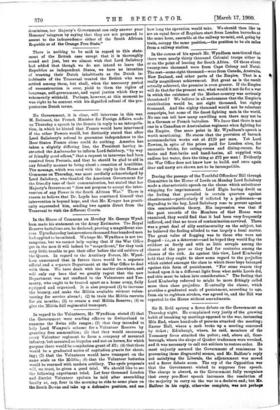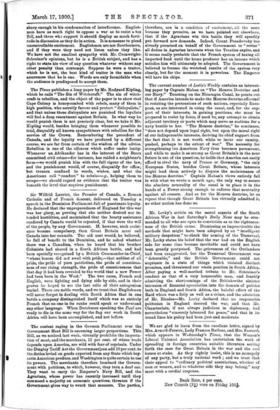Sir R. Reid sprung a fierce debate on the Government
on Thursday night. He complained very justly of the growing habit of breaking up meetings opposed to the war, instancing Mile End, where hundreds of persons attacked the meeting; Exeter Hall, where a mob broke up a meeting convened by ticket ; Edinburgh, where, he said, members of the Yeomanry force attacked the police; and, above all, Scar- borough, where the shops of Quaker tradesmen were wrecked, and it was necessary to call out soldiers to restore order. He most unjustly accused the Government of remissness in preventing these disgraceful scenes, and Mr. Balfour's reply not satisfying the Liberals, the adjournment was moved and a fierce debate arose. The cry of the Opposition was that the Government wished to suppress free speech. The charge is absurd, as the Government fully recognises that every pro-Boer speech increases the resolution of the majority to carry on the war to a decisive end; but Mr. Balfour in his reply, otherwise complete, was not perhaps
sharp enough in his condemnation of interference. English- men have as much right to oppose a war as to resist a tax Bill, and those who support it should display as much forti- tude in discussion as they do in action. It is nonsense to plead uncontrollable excitement. Englishmen are not Southerners, and if they were they need not listen unless they like. We have not the smallest sympathy with Mr. Cronwright- Schreiner's opinions, but he is a British subject, and has a right to state his view of any question whatever without any other penalty than contempt. Suppose he were a traitor, which he is not, the best kind of traitor is the man who announces that he is one. Words are only formidable when the audience is predisposed to accept them.

































 Previous page
Previous page